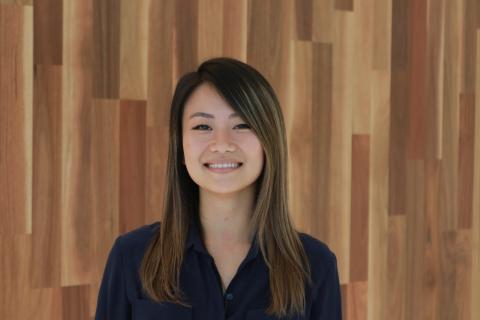
As a medical scientist specialising in cytogenetics, Ling Sun recognises the fundamental importance of genomics to the future of medicine. This was a driving factor in the Monash Health scientist's decision to upskill through a leading-edge cross-training program offered by Melbourne Genomics.
Ling recently undertook a 16-week (part-time) secondment to Peter MacCallum Cancer Centre, through which she learnt how to identify and interpret changes in genes – a process scientists call ‘variant curation’.
We asked Ling a few questions about the program.
Tell us a bit about yourself.
I graduated with a Bachelor of Biomedical Science in 2008, followed by an Honours degree at the University of Melbourne. I began my career in clinical diagnostics at St Vincent’s Hospital central specimen reception as a laboratory assistant. In 2011, I became a medical scientist in Monash Health’s Cytogenetics laboratory. I have also recently completed the requirements for the membership of the Human Genetics Society of Australasia (HGSA).
Why did you choose to undertake the Melbourne Genomics cross-training program for medical scientists in variant curation?
I first heard about the cross-training program at a HGSA conference where Melbourne Genomics staff presented. The presentation was in conjunction with talks focused on genomics and next generation sequencing (NGS), and how these are benefiting medicine – especially in diagnosis and care for rare genetic diseases and cancer. The sessions inspired me to learn more, so I approached (Melbourne Genomics’ Lead Specialist Clinical Genomics) Dr Natalie Thorne during the conference, and she encouraged me to apply for the variant curation training. During my next work appraisal, I requested nomination for the training, which enabled me to spend time in another Alliance member laboratory to develop variant curation knowledge and skills.
Variant curation is a new area that Monash is seeking to implement in the near future, and a few of us have now undertaken the Melbourne Genomics training. Next generation sequencing, genomics and molecular testing is the way of the future and I feel it is vital to my career to upskill in this area.
How did you benefit from the cross-training program?
I have gained a variety of knowledge in the past four months here at Peter Mac. Most importantly, I have secured a very valuable skill set. Aside from learning everything that I was expected to learn, cross-training in a different organisation has been immensely beneficial. I was able to observe variant reviews, and multidisciplinary and pathology meetings, which allowed me to see how ideas were formed and decisions were made. I had an incredible and attentive trainer, Ain Roesley, who helped me every step of the way. Overall, this has been one of the most rewarding and enjoyable experiences in my career so far.
What do you hope to achieve with the new knowledge you have gained?
Eventually, I will work with my colleagues who have also undertaken variant curation training, and together as a team, implement NGS testing and subsequently train more staff at Monash Health.
Why do you think variant curation, and cross-training in this area, is important?
Currently, variant interpretation presents a bottleneck in the genomic testing process, across diagnostic laboratories internationally. I believe it is important to upskill as many people as we can in this growing field, so we can contribute to shorter test turnaround times and ultimately improve patient care.
